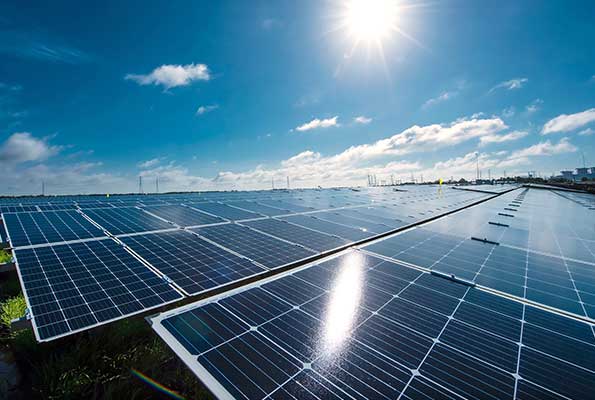Bahrain has secured agreements to establish a 72-megawatt solar park project as the country strives to be emissions-free by 2060.
According to the Bahrain News Agency, the project is a component of Bahrain’s renewable energy plan, which seeks to expand the proportion of clean energy in the nation’s electrical mix to 5% by 2025 and 20% by 2035.
The Sakhir region of southern Bahrain will host the solar PV project, which will comprise rooftop and ground-mounted solar power systems as well as electric vehicle charging stations at the Bahrain International Circuit, the University of Bahrain, Exhibition World Bahrain, and the Al Dana Amphitheatre.
According to Yasser Humaidain, Minister of Electricity and Water Affairs, the solar park will contribute to Bahrain’s and its inhabitants’ sustainable economic development and is in line with the kingdom’s obligations to the international community.
He stated that increasing the usage of solar energy will contribute to environmental protection and resource sustainability.
Bahrain, the smallest oil producer in the Arabian Gulf, is “making progress” in a number of areas as it strives to reach the net-zero goal, Mr. Humaidan stated at a May 2023 event.
In order to monitor their emissions in real-time, he added, “We have collaborated with some of the major industrial emitters and we have created a system of continuous emissions monitoring.”
Since its establishment in 2021, Bahrain’s Al Dana Amphitheatre has hosted a variety of local and international performers.
In order to cut emissions and reach net zero targets in the future decades, GCC countries are aiming to increase the production of renewable energy.
The second-largest economy in the Arab world, the UAE, is making significant investments in renewable energy projects and has unveiled a number of programs in an effort to achieve net-zero emissions by 2050.
The nation is working on renewable energy initiatives like the Barakah nuclear plant, a two-gigawatt solar facility in the Al Dhafra neighbourhood of Abu Dhabi, and the five-gigawatt Mohammed bin Rashid Al Maktoum Solar Park in Dubai.
The greatest economy in the Arab world, Saudi Arabia, is working on a number of new renewable energy projects with the goal of reaching net zero by 2060.
The International Energy Agency predicts that this year, as nations attempt to solve potential energy shortages, investment in clean energy will surpass spending on fossil fuels and reach a mark of USD 1.7 trillion.
According to the Paris-based agency’s World Energy Investment report from May, global energy investments are expected to total USD 2.8 trillion in 2023, with more than 60% of that amount going toward sustainable technologies including renewable energy, electric vehicles, nuclear power, and heat pumps.
In conclusion, Bahrain’s commitment to establishing a 72-megawatt solar park project marks a significant step toward its goal of becoming emissions-free by 2060. As part of its comprehensive renewable energy plan, Bahrain aims to increase the share of clean energy in its electricity mix to 5% by 2025 and 20% by 2035. The solar PV project, located in the Sakhir region, highlights the nation’s dedication to sustainable development and environmental responsibility.
The collaboration between Bahrain’s Ministry of Electricity and Water Affairs and major industrial emitters to monitor emissions in real-time showcases the country’s proactive approach to reducing its carbon footprint. This commitment resonates with the broader efforts of Gulf Cooperation Council (GCC) countries, including the UAE and Saudi Arabia, which are also working toward net-zero emissions through ambitious renewable energy initiatives.
The global shift towards clean energy is evident in the increasing investments being made in sustainable technologies. The International Energy Agency’s prediction that clean energy investment will surpass spending on fossil fuels signifies a pivotal moment in the transition to a more environmentally friendly energy landscape. With a focus on renewable energy, electric vehicles, nuclear power, and other sustainable technologies, the world is taking significant strides towards a more sustainable and greener future.
As Bahrain and other nations continue to make substantial strides in their renewable energy endeavours, it is clear that the path toward a cleaner and more sustainable future is being forged through determined international cooperation and innovative technological advancements.



